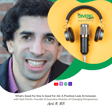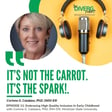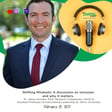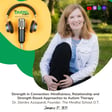Reframing Autism: Erasing Negative PR
00:00:00
Speaker
um It would be to completely obliviate, if I can use a Harry Potter verb, to obliviate from people's memory, like the last 60, 70 years of the PR campaign against autism.
00:00:14
Speaker
If I could just like make all that go away and what what I would desperately want to disappear if I had to choose one thing was simply the idea that most people have consumed hook, line and sinker, that autism is bad.
00:00:31
Speaker
That if I had bought one thing from my magic wand, it would be if I could remove people's automatic assumption that that idea is true and good and doesn't require visiting, that would be it.
Diverge Podcast: Connecting Knowledge and Parenting
00:00:46
Speaker
Welcome to the Diverge podcast, inclusive of autistic and other neurodivergent voices. We exist to bridge the gap between specialized knowledge and everyday parenting. We are on a mission to bring together the most forward thinking experts who are deep in the trenches, championing neuroaffirming and developmentally based approaches to therapy, to education, and life.
00:01:08
Speaker
Designed for parents, educators, friends, and allies. Conversation by conversation, insight by insight, we are building community and making space for all kinds of minds.
00:01:22
Speaker
Hi, everyone. Welcome to the Diverge
Introducing Dr. Alicia Broderick
00:01:24
Speaker
podcast. Today on the podcast, we have Dr. Alicia Broderick. She is the professor of education at Montclair State University, where she focuses on her work as a disability study scholar and a scholar of critical autism studies.
00:01:38
Speaker
I first met Dr. Broderick through an introduction from one of her colleagues. I had sent her an email with a bit of our backstory, and she responded almost immediately. I'm not sure if you know about me and my work, but I applaud you for homeschooling.
00:01:50
Speaker
She then introduced me to my new favorite term to describe my son's learning style, autodidactic, a word that beautifully captures the very impressive, often neurodivergent skill of being self-directed and self-taught.
00:02:01
Speaker
I've gone back to that email many times over the past two years. On this journey, which can sometimes feel incredibly unique and a little isolating here and there, her words have been such an anchor and an inspiration to keep going.
00:02:14
Speaker
ah What I love most
Centering Autistic Voices in Conversations
00:02:15
Speaker
about Dr. Broderick's work is that it places autistic people and their humanness at the very center of the conversation. And it challenges us to imagine a world where autism is viewed as neutral, not without support, but simply neutral. In doing so, she gives us permission and tools to question the systems we find ourselves navigating all through a deeply researched and academic lens.
00:02:37
Speaker
As we are coming up on April, Autism Acceptance Month, This is a really powerful conversation, one that I hope will continue to challenge all of our biases, mine included, and help move the needle forward, even if just a little bit.
00:02:52
Speaker
So let's get into it.
00:02:55
Speaker
All right. Well, welcome to the podcast. um Would love if you could introduce yourself, give a little bit of background, especially around your academic focus um and why you are passionate about um the work that you do.
00:03:09
Speaker
Thank you, k Christy. So hi, everybody. I'm Alicia Broderick. And um I've been doing the work that I do for, i don't know, um about 30 years, maybe 35.
00:03:22
Speaker
um And I started this work just by working as an aide in a residential school that ah served mostly autistic kids and had the time of my life.
00:03:37
Speaker
Yeah. going to work every day and um the kids were awesome and I had great fun and it was amazing. And so um a few years later, i I went, decided to, you know, go to grad school and continued sort of working in inclusive ah preschool and and kindergarten environments.
00:03:57
Speaker
um And then I did the doctorate because I really, really enjoy thinking and writing about how complex all of this is. Like, these are not simple questions.
The Complexity of Autism Scholarship
00:04:12
Speaker
so yeah. And that got me into sort of the scholarship piece of it, but I've always tried in my, um in my scholarship, I've always tried to ah ensure that the questions that I'm asking and the things that I'm writing, no matter how sort of complex and professorial they may be, they are nevertheless have real life material,
00:04:34
Speaker
sort of implications for humans. Yes. For autistic people and the families of autistic people. Absolutely. Yeah. And that definitely comes through in your work.
00:04:45
Speaker
And something in particular I was listening to last night, which we'll talk about little bit, but yeah. one of the questions I ask, I've made a joke before. My favorite, favorite podcast starts off with what's your sun, moon and rising, but that doesn't make any sense here.
00:04:58
Speaker
um Is the magic wand question. If you could wave magic wand, change anything about the way the world sees neurodivergence, the conversation around neurodiversity, autism, what would it be?
00:05:10
Speaker
Um, It would be to completely obliviate, if I can use a Harry Potter verb, to obliviate from people's memory, like the last 60, 70 years of the PR campaign against autism.
00:05:23
Speaker
If I could just like make all that go away and what yeah I would desperately want to disappear if I had to choose one thing was simply the idea that most people have consumed hook, line, and sinker, that autism is bad.
00:05:40
Speaker
Yes. um that That if I had bought one thing from my magic wand, it would be if I could remove people's automatic assumption that that idea is true and good and doesn't require visiting, that would be it.
Challenging Autism Stigma and Stereotypes
00:05:56
Speaker
um One of the things that's really interesting about your work, which we'll get into in a second, is how much it makes you think about that statement as a whole, that autism is bad, that it this is an epidemic, that it is, you know, this just growing problem.
00:06:11
Speaker
um And what I find so interesting is as a parent, when my son was diagnosed, we were totally that, that those sets of parents who did not see it coming. i was like, he's just talking as much as he should be.
00:06:24
Speaker
And all the early interventionists and clinicians are like, they have no idea what's going on. Like, They don't see this. And most likely because neurodivergence has been a part of our family on both sides for a very long time just didn't have a diagnosis attached to it um for a variety of reasons.
00:06:40
Speaker
um And so when I read your work and was going through everything, that was one of the places where I had to kind of stop and pause and be like, actually, yes, that line of thinking has really infiltrated my brain, even though it doesn't make a ton of sense because I know exactly where all of this came from.
00:06:58
Speaker
and So it was a huge like sort of mindset shift. This is ordinary and we have pathologized it. It is not only ordinary in many ways, it is extremely incredibly valuable.
00:07:09
Speaker
Yes. So my my my first take would be to like make it value neutral. Right. Value neutral. yeah the Remove the, you know, the the the the stigma and the toxicity around the assumption of pathology, number one, and just make it value neutral.
00:07:25
Speaker
um At the same time, i want to also acknowledge the extreme value that exists without treading into, i personally, personally, I'm very, very put off by the whole, you know, autism is a superpower thing. Yeah, I don't like that. It's just as problematic.
00:07:45
Speaker
Yeah. Right. As the um as the pathology piece in many ways, but at the same. So if we can just go for value neutral and acknowledge what might be hard and and figure out how to support people through hard stuff.
00:07:58
Speaker
But also there's a lot that's really, really valuable, which is just called, I don't know, parenting a human. Yes, 100%. And culture. Like, we all don't bring the same things to the table, and that's kind of the idea.
The Autism Industrial Complex
00:08:10
Speaker
um No, so just to ground everyone, because I did not mention in the beginning, ah you you have done ton of work, ah but I think what's most, like, publicly available is your book, The Autism Industrial Complex, um which is a great book, ah but also a very provocative and powerful title. So can you just kind of ground everyone...
00:08:30
Speaker
in what that means, like explain how this AIC that you call it manifests in educational, therapeutic and broader social context. Sure. So I've been doing sort of autism related research for, as I said, 30 plus years.
00:08:45
Speaker
And Forever, it struck me that, you know, nobody's talking about the economy of this. yeah This is, or the commerce, right? This is, this is a commercial context.
00:08:56
Speaker
And and i I say that about myself as well. My early work was very, very, the autism industrial complex as a book in many ways was the outgrowth of my original dissertation study, which I conducted 20 years prior.
00:09:09
Speaker
Wow. Wow. And and i published pieces of it, but not very much of it because I wasn't satisfied with it. It was all an analysis of of rhetoric, right? Rhetoric that families making decisions about their supporting and educating the young autistic children, non-autistic families were making Right. And I was analyzing, you know, the rhetoric and the language, but I'm like, there's something missing about this. Yeah. um And so I finally, you know, sort of hit upon the fact that seriously, everybody in any kind of discipline discipline is doing research on autism. And I don't care if you're looking at, you know, gender studies, queer studies, know race, you know, um you name it.
00:09:54
Speaker
And like nobody was talking about the economy. And I was like, OK, this is the elephant in the room. Yeah. And I'm going to talk about it. And the the the but title comes obviously from the military industrial complex, which was Eisenhower's idea, you know, um back in the early 60s, wherein he basically said, look, it's a problematic thing when not just that we go to war, obviously it's, you know, yeah we go to war, but it's a problematic thing when the assumption that we will go to war is embedded in the economy and in our jobs in such a way that we have an incentive to keep it going and reproduce it.
00:10:32
Speaker
Correct. That's a problem. When we're embedded in the economy, that becomes a problem. And um that's exactly what happened i in my judgment, in my analysis with autism support intervention services.
Capitalism and Autism Narratives
00:10:48
Speaker
It was the minute we got it so um dug in to the economy, it became an entity unto itself. And then it became less about what autistic people need and not remotely at all about what autistic people want or desire. Correct. Like it's just about, Hey, this is a great market.
00:11:09
Speaker
ah So, yeah, in that respect. So you talk a lot about how the culture is primed to believe certain things about autism before they ever even interface with an autistic child many times. Or I should say, know that they're interfacing with with autism.
00:11:22
Speaker
ah What are some of the narratives that this autism industrial complex uses to instill fear and essentially sell the product? Okay, so this is ah this is a piece that I would add, a layer I would add to my text if I could go back and rewrite it now a few years after I wrote it in the first place.
00:11:40
Speaker
um The subtitle of my book is How Branding, Marketing, and Capital Investment Turned Autism into Big Business. What I have come to recognize is that all of the things I've talked about in terms of cultural narrative, cultural logic, the rhetoric, all of that, that's PR.
00:11:57
Speaker
That's a PR campaign, right? So I spent my summer... in a very weird way, reading Edward Bernays, who is known as sort of the father, if you will, of of the field of public relations.
00:12:09
Speaker
And he was a propagandist for the government during World War One, and apparently a very successful one. And after that was over, he seems to have asked himself, um well, if this was so effective,
00:12:23
Speaker
um in supporting the um the interests of the state, of the nation during wartime, why could these same sets of tactics not be deployed during peacetime in the interest of industries, corporations, and capital? so And this is the piece that I wish I had had conceptually that ties all of this together because it's it's literally the autism industrial complex, the first 40 years of it, are about ideas.
00:12:54
Speaker
It's about narrative. It's about rhetoric. And this is a prolonged and extensive PR campaign. And the idea is the idea that's being put out into sort of the the air, if you will, for people to breathe and to consume is a couple of things. The idea that autism is bad, period. Mm-hmm.
00:13:14
Speaker
and And to make that not a question, right? Nobody asks, is autism bad or is it good? No, autism is bad, period. um It is tragic. It is catastrophic. It is hopeless.
00:13:25
Speaker
um It is this, you know, this horrifying tragedy and catastrophe, right? That autism is bad and that therefore intervention is good. um And and those those two ideas get get sold as as sort of a package.
00:13:41
Speaker
And in the process of selling these ideas for consumption, this is a very old playbook. It's an old political playbook. It's is not you know new. It's not rocket science.
00:13:52
Speaker
people ah People's hopes and their fears get manipulated. Right. right Right. So if you want to sell something, this is, you know, you look at any political campaign, you need to make somebody fear or the other candidate. If you vote for this guy or if this guy gets in office, all these horrible things will happen.
00:14:07
Speaker
Right. You need to contrast that with the sense of hope. Look, if you vote for my candidate, all these wonderful, amazing, positive things will happen. Right. So it sounds very familiar. Right. So in this um decades long PR campaign that was selling the idea that autism is is bad.
00:14:25
Speaker
um The fear that was being sold was um this this idea that your child would essentially live a life as a non-human. I mean, it was is really very, very, very, damic and or that your child would necessarily have to be institutionalized, right? Your child would never, never experience human connection, never um like but never communicate with others, never develop relationships, never go to school, never live independently, right? It was this very catastrophic thing that families consumed, oh my goodness, what if this happened to my child, right?
00:15:09
Speaker
And then they simultaneously linked hope With what they were selling.
Questioning Early Interventions
00:15:15
Speaker
Right. Right. Well, if that's the fear, then we're going to couple that because they have to be connected. It's just like in politics.
00:15:21
Speaker
If this guy gets elected, it would be terrible. But if you elect me, this will be great. i very very hopeful And the hope the hope that got tied up in all of this PR campaign, all of this rhetoric, the hope that got tied up was the hope for recovery through intervention. Basically the hope that isn't it terrible that you have an autistic child. Well, guess what?
00:15:42
Speaker
You could have a considerably less autistic child, maybe even a non-artistic more or less for all intents and purposes child if you buy our intervention. Correct.
00:15:53
Speaker
And what I like about your work before we go too much deeper into this, um because I have a lot of friends who have autistic kids and we have a lot of debates, is you don't necessarily center the conversation around one specific intervention.
00:16:10
Speaker
It's the narrative that allowed that intervention to sort of be the answer. um And I think that's a really interesting because it takes us to a different place as parents and caregivers of autistic kids, right? This isn't about picking the right thing, the right intervention, what we're doing in this moment.
00:16:28
Speaker
It's about how we think of this overall and sort of almost deconstructing it. in a way. Absolutely. And the idea that we need to pick an intervention at all, let's be clear, yes that's an idea that also bears deconstruction.
00:16:41
Speaker
yes right um Autistic people have existed for millennia, happily, successfully, productively, having families, contributing economically and culturally. I mean, in in all kinds of ways, because nobody put a label on them as autistic and nobody tied that label to an intervention Right.
00:17:04
Speaker
Right. right And so the fact. So, again, it's not about it's not about what the intervention is. um And in many ways, the reason I argue in the book, the reason that, you know, the the the behavioral industry, the ABA industry is is sort of commercially dominant, if not monopolistic, is because, well,
00:17:24
Speaker
To be fair, the academic behaviorists were the people that were driving much of the production of the PR campaign. Right. So they produced and put these ideas out for consumption and they were, therefore, um they were constructing the ideas to commercially benefit themselves.
00:17:40
Speaker
Right. right does It doesn't mean that, you know, it yeah. So all these other kinds of interventions are competing in the marketplace and It's on unfair footing, right? I mean, there's a monopoly status, but at the same time, they're benefiting from the fact that at least the ground was laid establishing intervention as a given.
00:18:01
Speaker
Right. Yes. no And that needs deconstructing as well. Yes. And just a kind of a practical story, ah because I think it's helpful here. ah So I talk about my son all the time. I have an autistic son.
00:18:14
Speaker
I recently had a daughter two years ago. oh I had people in my life who were shocked by the idea that I didn't think I needed to prep my son and in any special way for the birth of my daughter.
00:18:30
Speaker
Um, and when my daughter showed up, I, I had known a lot about raising kids. I knew a lot about like the dynamic, um, being you know how you interact between the two of them and the best big brother.
00:18:44
Speaker
There was not like a stereotype about it other than he needed to get out of the house a little bit more. We all did, um but but it was fine. i mean, it was it was typical kids. And even ah even to this day, still a great big brother.
00:18:58
Speaker
And it was one of those things where the knee jerk reaction of everyone was like, no no, no, you don't understand. He's not going to be that chill kid anymore just because of X, Y, Z. And the reality of it was he he was fine.
00:19:10
Speaker
He's fine. He's a big brother. Yeah. Yeah. theory um that I that I've, that it, and it's it's purely based upon observation of a bunch of kids. I've never like studied it formally, but I have this theory that, um,
00:19:24
Speaker
and When you look at ah sibling relationships between sibling, between autistic and non-autistic siblings, right? um There is a distinct, in my view, in my observation and analysis, there is a distinctly different pattern of the nature of the relationship depending upon birth order.
00:19:43
Speaker
So when the elder sib is autistic and the younger sib is non-autistic, in my experience, that younger sib is really very, very bicultural.
00:19:56
Speaker
Oh, interesting. And when the elder sib is non-autistic and a younger autistic sibling comes along, then once the families, once the parents are recognizing sort of autism in their younger child, they tend to feed the elder child a lot of narratives about why their sibling is different.
00:20:16
Speaker
Oh, interesting. And then you've got three or four or five-year-old who's like consuming those ideas and then tends to take a very deficit deficitized view of their younger sibling because they got it. Interesting.
00:20:30
Speaker
Whereas, Your daughter, that's just her brother. Yeah, just her brother. It's too young for you to feed that stuff to right now. And by the time any parent would try, she will already have figured out that that's just my brother. And there's a totally she already knows. Yeah.
00:20:46
Speaker
She like already knows. Like I've seen her like very early. She's, she's very verbal. So the verdict's still out on, on that side of things, but I've seen her. What'd you say? Could go either way. Could go either way. She's very verbal.
00:20:59
Speaker
um And she would, in the beginning, when she started getting word, she would like talk to him and she'd be like, why aren't you? Like I could see the look at her eyes like you don't respond to me like they respond to me. ah But she finds ways around it. She steals his toys.
00:21:11
Speaker
ah Bicultural. Yes. I love it. So let's talk about intervention a little bit. and we I mean, we talked about it some, but obviously a lot of people are told that they need intervention right away. um This comes up a lot on the podcast with various interventions and styles of dealing with things.
00:21:30
Speaker
People get very stressed out about timeline. And lately I'm finding there's kind of two camps, right? There's the, ah you're it's a race against the clock. You've got to get all this in before there are certain aids or neurology is just not going to be on your side, which we all know is not true anymore.
00:21:44
Speaker
Or ah we do things in our own time and in our own way. I think Jordan actually said that. I would love for you to kind of expand on this, your thoughts around intervention intensive therapy um and what parents should be really thinking about instead.
00:22:03
Speaker
Well, to to just back up up for a minute, the, again, the idea that intervention is necessary and good, let alone the idea that the need for intervention is urgent, right. And that it's time sensitive.
00:22:14
Speaker
All of that is grounded in the idea
Supporting Natural Development over Interventions
00:22:19
Speaker
that it is better to be, if not non-autistic, then at least less autistic than you are.
00:22:25
Speaker
Right. All of that is grounded. The idea of intervention of any kind, um, added to that the idea that there's any kind of a window of opportunity or that there's any urgency around timeline.
00:22:39
Speaker
That's all grounded in the we've got to make We've got to make progress now. We've got to make strides now. We've got to make, you know, ah and and by that, what that means typically is, is strides toward supporting this autistic child to develop in a more neuro normative way, in a more neurotypical way. How do we support something better approximating neurotypical or neuronormative development in this child? So there's a great underlying within any intervention conversation,
00:23:11
Speaker
there is an underlying, I will argue, devaluing of autistic experience and autistic development. Right. Preferential um valuing of non-autistic or neurotypical development. Right. So that's underlying it. In my view, that makes it inherently sort of problematic.
00:23:31
Speaker
um That said, it's completely understandable, particularly when the parents that are making decisions are, holistic parents, right? you're If you're a non-autistic parent and you have an autistic child, um I liken it to, you know, hearing parents who have a deaf child um who suddenly realize I can't communicate with my child because I don't speak ASL, right? So I need right try to intervene, get you know, cochlears or, you know, encourage lip reading so that my child can communicate with me. Well,
00:24:08
Speaker
when deaf parents have a kid and the kid is deaf, they don't have a deaf kid. They just have a kid. Right. ah So it's, everything is about your context, right? Right. Deaf parents don't get all bent out of shape when they have a deaf kid. Cause guess what?
00:24:21
Speaker
That's just a kid. And being a deaf parent, you can fluently communicate and interact with your deaf child. There's no problem. So the problem inherent in,
00:24:32
Speaker
you know, finding out that you have an autistic child is mostly restricted to being an holistic or a non-autistic parent. Right. Finding out that you have an autistic child. This is not a conversation that autistic parents by and large have about an autistic child. People don't get all bent out shape because, oh, that kid's like me. That's, I know how to do this. This is my kid.
00:24:54
Speaker
Yeah. um Kind of thing. So that said, you know, there's, so that is underlying all of the, the, the sense of of urgency and stress around intervention. And it is all completely understandable.
00:25:07
Speaker
At the same time, what I would like to, feel like parents need a permission structure. in some ways, whether it be from you know their pediatrician or you know an expert early interventionist or or somebody, but lots of parents, I feel like need a permission structure to just like, you know what, it's okay. yes Let's off.
00:25:31
Speaker
Let's see how this kid develops and let's support the kid in their developmental trajectory, right? that That's difficult for families in many, many ways and for lots of very, very valid reasons. I, you know, I totally recognize that. But i one of the things that I think makes it hard for people is they have no concept.
00:25:52
Speaker
Most people have no concept of autistic joy, for example, right? When people see it, you know, a two-year-old or three-year-old that's, you know, flapping and the parents are like, oh, they're stimming.
00:26:04
Speaker
like, that's joy. Leave them alone. This is artistic joy. Why is this a problem? Who is this a problem for? If it's a problem for you, then in you need to ask yourself, why is this a problem for me?
00:26:19
Speaker
Right. Well, and there's been, there's been many instances where I will say because of communication deficits, right? When my son needs something to say,
00:26:31
Speaker
it sounds like stimming, but when you really break it down, sometimes he's racing a car. Sometimes he, like, it's just playing and he doesn't have the same, like, communication tenor. i don't know if that's the right word. The rest of us do. So it's that's a very interesting conversation.
00:26:49
Speaker
ah so he plays artistically and he communicates artistically. Yeah. And it's so... Yeah. And I will say this and not to, but you know, I know we've had this conversation, but one of the first things that was done for us when we looked at DIR, understanding DIR is an intervention, um is a supervisor who came over to her house.
00:27:08
Speaker
The first thing she did was like, oh, that's typical kid behavior. That's it. And not, not because typical kid is like, right. But like, that's not something you need to worry about. i more There was a lot of that. And in in many ways,
00:27:20
Speaker
I won't say for the first time, but it gave us so much permission to just like calm down um because this happened right around the time we started homeschooling. And so it took so much pressure off of us to like not think we had to be working on this, this, this, this and this.
00:27:34
Speaker
um And you don't get that permission everywhere. In some places, absolutely. OTs tend to be very, have been very difficult. good for us in that respect. um Some speech therapists, but it's just so yeah, there there is no permission slip.
00:27:48
Speaker
um And you get a lot of paperwork with a lot of numbers on it that make you think a lot of things and you're sort of left to the wild of, we got to catch this up like right now.
00:27:59
Speaker
Right. And not only do you not get a permission structure to do nothing, you get coercion to do particular things. Absolutely. Or not even just, you know, I was put in a situation where I didn't even understand. i was like, oh, these services are available.
00:28:11
Speaker
He needs to learn to talk. You can go to this like preschool. I had no idea that like it could have been on his plan to like work on sitting in a chair. he was three. Three year olds don't really do that. Yeah.
00:28:23
Speaker
Why would anyone make any three-year-old sit in a chair for any length of time? Yeah. Yeah. So it's just, it's kind of starting to deep deconstruct
Targeted Support for High Support Needs Behaviors
00:28:31
Speaker
is a really good word. I feel like deconstruct all of those narratives, give parents permission to breathe.
00:28:36
Speaker
That said, I know what the put main pushback is going to be to this conversation. Oh, what if I have a parent, a kid who's smearing poop, banging their head on the wall? Like what about those really like high support needs? Yeah.
00:28:49
Speaker
Those things require support. Correct. light Yeah. Yeah. Right. So, I mean, so people always, when they're, when they're school age, the argument is thrown chairs, right? When they're younger, the, the, the argument is poop smearing.
00:29:03
Speaker
Right. Yeah. but That's fair. Okay. Both of these things bear addressing, right? But that doesn't mean that we're also going to sit a kid down in a chair and make them touch their head all day so they can look robotic and and as if they're non-autistic. Those are support needs.
00:29:19
Speaker
You know, if you've got a kid that is, you know, five years old, six years old and is still, ah you know, wetting the bed at night, that's about inter interoception, right? A lot of autistic people do not have great inter interoception.
00:29:33
Speaker
people And by that I mean, The internal signals that give you an idea about your body, things that tell you, hey, I'm hungry, I should eat something. Hey, I'm thirsty, I should drink something.
00:29:44
Speaker
Hey, that sensation my bladder means my bladder's full. I should go release it, right? A lot of the internal signals and signals, just as we know that a lot of autistic people process external sensory stimuli in different ways, some things feel more extreme, some things feel less extreme, the same goes for internal sensory processing, right?
00:30:06
Speaker
So when you are not really, really processing what these sensations are in my abdomen, and what is the relationship between those sensations and defecating or urinating, that's the kind of thing that you can do in a very targeted way.
00:30:20
Speaker
And by the way, that is one of the few, and people are going to really get mad at me when I say this, that's one of the few sort of defensible, very narrow applications of behaviorism.
00:30:31
Speaker
Right. Yeah. I'm like, that's valuable. Yes. Right. To draw a person's attention in a Pavlov, like to get one of those, you know, one of those sheets that when it gets wet, it makes a noise.
00:30:45
Speaker
Right. yeah You've got then an auditory sensation that's being paired with the physical sensation that yes, it doesn't take long for those to to click and then heighten your perception of the interoception.
00:31:01
Speaker
That's valuable. That's useful. But that's a very different thing from sitting some poor child down for 20 40 hours a week. And right trying to make them look at least less autistic.
00:31:12
Speaker
Right. or And I think you used the word pathologizing earlier, pathologizing everything to the point that you're not sort of experiencing who the kid is.
00:31:23
Speaker
Um, so one of the things that my husband and i did not know was problematic. We'll say in the holistic world, who's scripting, um, primarily because one of my biggest frustrations with my husband, since I met him is you'll in the middle of the conversation. He will have a movie reference in his head and he will start using that in the context of conversation. Okay. I think we're married to the same person.
00:31:47
Speaker
Yeah. drives me batty. But we have to interrupt and saying, are you're not talking to me, are you? You're reciting a line in some dialogue. Yes. Like I stop and like my brain like hurts for a second. I'm like, where did this come? And then I realized what's happening.
00:32:03
Speaker
um But so when my son gravitated to television and that was kind of what he would randomly do is try to quote this or that. And it wasn't a ton. Like we had no idea. We were supposed to be like worried about that.
00:32:15
Speaker
um And what ultimately ended up happening is that where is where the bulk of his language came from. He he learned to to script from those things. He always used it relatively in context if he would reference something.
00:32:27
Speaker
Either that or we were just really tuned into what the memory scanner meant when he walked into the
Scripting as a Communication Method
00:32:32
Speaker
high school gym. um But yeah, like we just weren't taught that that was a bad thing and we were kind of used to it.
00:32:37
Speaker
Well, it might not be a bad thing. That's communicative, right? I mean, i yes, I would rather parents be more tuned in into that. But not necessarily as a bad thing. Right. Right. But to recognize that, okay, this is, this is, that's actually a fairly complex um deployment of communication skill. Right. Right.
00:32:57
Speaker
um I haven't thought about it like that. It is actually to be able to reference that quickly. like so My son loves the movie um Meet the Robinsons. I do too, which is why he loves it.
00:33:08
Speaker
but But there's a scene in it where there's a science fair. It's in a high school gym. And this kid, Lewis, I don't know if you've seen it, but he makes a memory scanner. um So we walked into basketball one day at the like high school gym and he goes, the memory scanner. And he was just like, he recognized the gym setting. And i'm like, that's kind of cool, actually.
00:33:29
Speaker
Like, that's good reference. It's complex, and it enables. So here's the other thing about scripting, right, and repetition. When you see a movie, or, you know, listen to songs over and over and over and over again, you know, lots and lots of times, then that the repetition of those lines of dialogue becomes something that is a motor pattern, right?
00:33:51
Speaker
Right. And And for a lot of autistic people, spontaneous, extemporaneous production of spoken language is hard just because of the oral motor complexity involved. You've not only got the cognition involved with having a thought to communicate the language, right but you've got the oral motor organization and execution of it.
00:34:12
Speaker
Once you are engaging in kind of ah repeated things, that's something that you can produce. You can produce easily. It overrides the oral motor, sort of the praxis difficulty.
00:34:25
Speaker
Right. Enables you to still communicate um by drawing on shared cultural narratives. That's again, presuming that you've got the shared context. It's entirely different. You understand that, yeah.
00:34:39
Speaker
Yeah. Fortunately, um I gave them a lot of movies I liked, so I always knew where it was going from. But um no. To me, I wouldn't have had any idea what he was talking about because I never saw that movie.
00:34:49
Speaker
Right, it's a really cute movie. It's very heartwarming, it's got a good message. But yeah, no, so, and that makes a lot of sense. I find a lot of people aren't given that, it all goes back to that permission piece, like to understand.
00:35:03
Speaker
um And he would get so excited by it. if you If that kid sees a toy that he saw on television, oh my God, end of the world. It's like so exciting for him. So switching a little bit, because I want to get to this this one specific question.
00:35:18
Speaker
um I watched your NJACE talk. I think I got the acronym correct last night. I will link that and show notes because I think it's a really good like sort of primer. But one of the things you talk about is we had awareness for a really long time.
00:35:31
Speaker
We moved into this idea of acceptance. There is a bigger narrative, right, around... being more neurodiversity affirming, letting these kids sort of develop at their own trajectory.
00:35:42
Speaker
um And I like it. I like love the neurodiversity movement. It's easy to latch onto. It's fun. It's like celebratory in most spaces. However, ah one of the things I think about the word neuroaffirming is that It's the almost not polarizing enough.
00:36:00
Speaker
No one's going, no therapist, no clinician, except for maybe two really mean ones out there are going like, I'm anti-neuro affirming. That doesn't make any sense. And so it puts parents in this place is where it's like, okay, but what does that mean for real?
00:36:13
Speaker
and we can talk a little bit more about like unpacking some of the ableism, being comfortable, being uncomfortable while you're figuring it out. ah But like, how, How do you kind of like keep a movement like that from moving too far into a direction where the word becomes meaningless and we have to start all over again?
00:36:32
Speaker
This is a great question. um i mean, years ago in 2008, I wrote a piece, um co-authored a piece with Ari Nauman when we were first looking at these like dueling narratives, right? Between sort of autistic narrative self-representation and non-autistic parents of autistic people, narrative self-representation.
00:36:50
Speaker
And we asked this question in that, you know, what if the like the neurodiversity movement had emerged 20 years earlier and we had neurodiversity as a as an overarching concept? You know, would that would that have helped? I now think the answer to that is no, it wouldn't help necessarily at all.
00:37:09
Speaker
Right. Because it's in. so here's what I will say. Follow the money. all of the money neurodiversity has emerged within capitalism, right. In the same ways that, you know, autism as a concept emerged within capitalism. And so I sometimes see like a, uh, I think it's a neurodiversity therapy collective has this little sort of poster thing that goes out. says basically neurodiversity, um,
00:37:37
Speaker
Nerd diversity is a human rights campaign, not a marketing campaign or something along those lines. Right. Right. Yeah. My response is, guess what? It's both. Yes. Yes.
00:37:49
Speaker
Yes. It is absolutely an activist movement and human rights campaign. Right. But it's, it has been appropriated. Yes. Right.
00:38:01
Speaker
By capital. Right. Right. Absolutely. that I am. I'm involved with this yeah think tank of of people in um marketing, like professional marketers.
00:38:11
Speaker
Right. people who are and And they have this whole neurodiversity think tank. And oh, yeah, they're this is totally a marketing campaign. Right. They're all in on that. And so I've been sitting in a participating in these sessions just to say,
00:38:27
Speaker
I'm going to try to offer critical plans on what need. Yes. There's no stopping it. Right. That train has left the kitchen that cow was out of the barn. Right. It is also always a marketing
The Neurodiversity Movement: Rights and Marketing
00:38:38
Speaker
thing. And so neuroaffirming, sure.
00:38:41
Speaker
it It would, would it make me feel better than, To have a therapist whose website says they're neuroaffirming, sure, it absolutely would. But that's not going to assure me that that's going to be a great fit for my kid. Because the first thing I'm going to ask is, are you just cashing in on this as a brand?
00:38:59
Speaker
Right. when using it to um get better access to a particular market of clients, right? Right, right. By neuro affirming. So the devil is in the details, right? And and for me, the the question becomes, right? Is is this therapist neurodivergent?
00:39:15
Speaker
um but They are I'm going to have a higher degree, not a complete degree, but a higher degree or level of confidence, right? What they say, what they mean when they say neuro affirming is something I can can live with and get on board with.
00:39:31
Speaker
You know, I've been in meetings, I've sat in um sort of conferences and and think tanks and these, you know, like weird little kind of spaces with people that are like corporate leaders, government leaders, like one percenter kind of thing.
00:39:50
Speaker
And they're all over neurodiversity rhetoric. and then It sounds great. Yeah. But they're using it. For capital gain. yeah The same as everything else. So you you just have to you you have to follow the money.
00:40:07
Speaker
And my my again, it's not a litmus test, but it's it's really really um it gives you a lot of information whether the therapy practice in question is run or owned by autistic or otherwise neurodivergent people.
00:40:25
Speaker
Exactly. um And it's really interesting too, because this goes into a little bit of a ah broader conversation. Something like neurodiversity affirming, sort of the way I see it is an unraveling and an unpacking of a lot of things, right?
00:40:44
Speaker
Very culturally. And it reminds me a lot, i was thinking about this last night, listening to your talk, right? Like anti-ableism is very similar, has very similar effects to anti-racism.
00:40:55
Speaker
yeah And until you get into a position and where you sort of, and I'm speaking purely as a white person here, like acknowledge the fact that there are systemic ideas that have shaped the way you think about race.
00:41:09
Speaker
Right. And are comfortable saying you have racist tendencies and unpacking those and being uncomfortable and the conversation, not always being warm and fuzzy, which is one of my kind of biggest issues.
00:41:20
Speaker
beefs with the world that I live in like the work is not warm and fuzzy. You can't really create much progress. And I feel that way about anti-ableist and even like the neurodiversity movement, right? As a parent, until I'm comfortable realizing where I'm uncomfortable and dealing with that, like I cannot support my kid to the fullest extent. And it's not really, it's not really a place you arrive at.
00:41:49
Speaker
Like we're all part of the system, right? but I think I mentioned at the beginning, like I've had, have consumed many narratives about autism and had very, a lot of stereotypes in my head. ah And it takes a long time to undo those things.
00:42:03
Speaker
and And they don't get done at all until you ah recognize and acknowledge and admit that they're there. Right. So when I talk to people, I'm out i'm like, look, as person,
00:42:14
Speaker
as a non-autistic parent of an autistic child, possibly the most difficult work you're going to have to do is reckoning with your own internalized. Yes. Autistophobia and anti-autistic ableism.
00:42:28
Speaker
Yeah. Like, I don't have any of that. I'm a parent of an autistic child. I'm like, totally do. I have it. Yeah. Yeah. I'm not saying that it's your fault or that you're a horrible person, but you live in this culture and you grew up consuming this PR campaign. There's no way you don't.
00:42:47
Speaker
There's just no way you don't. Guess what? Many, many, many autistic people have internalized autistic phobia. Guess what? So do women have and internalized oppression. So do people of color have internalized oppression systems. Yeah.
00:43:01
Speaker
Right. There's systems you've grown up in. And I think that's totally fair. And the one thing we have talked about on a couple of other podcasts is, you know, when you're, when you're fighting for, for resources for your kid, or in my case, like moving them out of a system like school, that just wasn't making sense.
00:43:15
Speaker
Yeah. Sometimes you also have to take a step back and say, this isn't just about that, like, sort of anti-ableist, autistophobia conversation. I'm like, this is also about the way the world views behavior in kids.
00:43:28
Speaker
And so maybe we go back to this conversation. i liked your your permission conversation a lot. So... If you so could sort of like rewrite the script and the process for parents who find out they have an autistic kid, we'll assume they're autistic parents or just haven't figured out that they're not, ah which happens to lot quite frequently.
Connecting Parents with Autistic Adults
00:43:50
Speaker
How would you change? Like, what would be your ideal sort of process?
00:43:57
Speaker
My ideal process would be to get families connected kids. autistic parents to get non-autistic parents connected with autistic parents. Yes.
00:44:13
Speaker
Right. Because I think that's a perspective. This is one of the things I do in my coursework. I teach ah mostly pre-service teachers, right? Who are going to be teachers of students with disabilities.
00:44:25
Speaker
And throughout the rest of their program, they have all, you know, all their other professors in all their classes, like bring in parent speakers and you know, you up and I'm like, okay, you guys have gotten enough of that because by and large, a lot the speakers that you've had brought in are parents of autistic kids who have all this internalized autistic phobia, right? yeah that there are there's There are other people I want you to hear their perspectives and they are autistic adults.
00:44:55
Speaker
Yeah. So, and people are well, what about the parent perspective? I'm like, you've got a lot of that. These people are also parents. Right. They're autistic parents. Let's, let's hear that. guy So I would, I would connect people with the community of autistic adults because it will help to diminish some of the fear mongering garbage that you're being exposed to about. Right.
00:45:15
Speaker
Child will never have a life. They'll never live independently. They'll never be able to, don't know, have a dog or drive a car or. Right. minute Relationship or. support themselves economically, right?
00:45:27
Speaker
um All of that is true, by the way, for non-autistic children as well. Right, yes. don't spend all of our time worrying about it, but I think it's important to connect people with autistic adults.
00:45:41
Speaker
um Autistic parents are even better, but at a minimum, autistic adults um to simply get sort of an antidote to that fear-mongering, you know, horrible, traumatic you know, um tragic future that you keep imagining and having sort of waking nightmares.
00:45:59
Speaker
Yes. There's that. The other piece is that to go back to the permission structure question. um And again, you're going to get, you know, sort of probably a lot of unhappy responses to this, but um I think people need permission not to subject their children to schooling period.
00:46:20
Speaker
I, You know, i have colleagues who hate when I talk about this. Oh, please. This is like partially. Right. And I'm like, you know what? Inclusion is not a uniform, a uniformly good or benevolent or beneficial thing.
Inclusive Education and Potential Trauma
00:46:36
Speaker
Yeah, sure. It can be for some kids in some circumstances. It also is a mechanism of harm and including autistic kids. Um, as I'm going to say ah a majority of the time, i'm not going to try to put a fake number on it, um'm but I'm just going to say in a majority of cases, um I think that inclusive education for autistic kids is harmful.
00:47:02
Speaker
It's traumatizing. And a lot of these so-called artistic behaviors that we see in classes, um in classrooms and in schools, that's trauma response.
00:47:13
Speaker
Oh, yeah. i could We could do a whole podcast about that. Right? So much of what we think of as, you know, a problematic autistic behaviorism Those are trauma responses. And this question that I have is, you know, would we be so horrified about, you know, autism and therefore autistic people if we let more autistic people develop naturally and in supported environments that do not punish them for being autistic? Right.
00:47:43
Speaker
Right. so we would have ah We could have a generation of healthy, well-adjusted autistic people if we stopped sending them to school. Yeah. Right? So that that's another thing I talk with families about. I'm like, you know, the primary benefit schooling, I'm going to again, get in a lot of trouble for saying this, is subsidized child care.
00:48:07
Speaker
And there's a benefit to that for parents' ability to have employment. right right That is an undeniable sort of benefit. At the same time, you've got to ask yourself as a trade-off, is it worth what it's potentially doing to your child in terms of harming, traumatizing them, and in terms of their eventual mental health?
00:48:27
Speaker
So autistic people, and you and i talked a little bit about this at the Jordan Zimmerman event, have, I would, I'll call it a heightened need, ah heightened desire for autonomy.
00:48:40
Speaker
Yes. Okay. um it is It is a very, very quintessential, like it's it's part of the essence, I think, of being autistic is this need for agency, need for autonomy, need for control over one's own self, body,
00:49:02
Speaker
what happens to you. Correct. One is nothing but the removal of all of that and the teaching of the child as subject that guess what you do not have control over anything in your job in this situation is to submit to what I'm telling you, you have to do.
00:49:18
Speaker
Right. It's like a huge exercise in domination. Yeah. And it is not, i'm I don't think it's good for any child. Right. However, I think it is particularly damaging. Right.
00:49:28
Speaker
for autistic children, right, that has enormous ripple effects um throughout other aspects of of their development. And so removing that kind of, um x the removing the assault on one's autonomy, and right which is also generally coupled with a sensory assault, right like which both of those two combined result in a kid that's going through six or seven or eight hours of their day with their entire body flooded with cortisol, flooded with adrenaline, flooded with all of these toxic things
00:50:07
Speaker
um hormones and neurochemicals that get produced under fight or flight kind of responses. You've got a kid in a constant state of stress, sometimes culminating in actual shock, physiological shock, right? In terms of shutdown and or meltdown. So, you know, I...
00:50:28
Speaker
I autistic kids are also incredibly autodidactic. And what that means is they learn because they're curious and they're going to learn what they're interested in. And you know
Autistic Learning Styles and School Critique
00:50:38
Speaker
what? Just leave them alone.
00:50:39
Speaker
Yeah. Leave the child alone. Put interesting stuff in front of them. Yeah. Support the exploration of their deep interest. You can't do that in a school. No. Deep interests are punished in schools Yeah.
00:50:53
Speaker
or they are used as a hostage, like a reward. Oh, you wanna talk about that thing or read about, look at something you're really interested in? Do this thing for me first, and then you can get two minutes of doing that, right?
00:51:06
Speaker
It's absolutely obscene the way we do things. But if you're that self-driven, autistic kids are actually much more, I'm going argue, self-directed and self-driven as learners.
00:51:17
Speaker
Oh, absolutely. so Yeah. And so if we don't have a kid in a schooling experience where they're not being subjected to the sensory assault and they're not being subjected to the constant assault on their own autonomy, then um guess what?
00:51:33
Speaker
They tend to develop socially, emotionally, cognitively in terms of language, academically, they develop in much healthier ways and much more rapidly when you just leave them be.
00:51:49
Speaker
And that's, and there was a question sort of baked in there to ask you, which you answered essentially, but it's like when we do all of these sort of interventions and they become interruptions, which is my new favorite phrase.
00:52:06
Speaker
What are we denying our kids developmentally? Cause I think that there's this like idea of the intervention either works or it doesn't, but we don't often talk about what is it stunting developmentally that might otherwise be there.
00:52:21
Speaker
Um, And I don't think there's any research around that. But if anybody wants to take it on, please. and And that's a really, really important question. And the answer to that is is the answers to that are infinite.
00:52:33
Speaker
Right. right Whatever your kid is passionately interested in, I will guarantee that that can be a vehicle for reading, writing, oral language development, for developing an understanding of mathematics, for developing an understanding of cause and effect and scientific method. ah Not because somebody sat you sat your kid down and taught them a lesson on scientific method, but because...
00:52:59
Speaker
Guess what? Humans learn. Yes. Humans learn. You know, they don't necessarily need to be taught everything. Not everything. Well, I think people really, this is a whole new conversation, but Don't really understand what structured school curriculum looks like for the most part.
00:53:20
Speaker
So going back to, I've told the story to do a friend, science, geography, social skills, I think, social studies. I can't remember what the subject was. was going through my son's like curriculum that I used to just kind of keep me on track at the beginning of the year.
00:53:35
Speaker
Opened up these three things and I'm like, science to love science was worksheets on over, under, in like a bunch of classifying things. Moved to geography. I'm like, okay, we'll come back to that geography. Same exact thing.
00:53:46
Speaker
And then there was some other subject that was basically covering the same thing. I'm like, number one, he knows these number two. like his biggest limitation is expressive. So we can't sit here and circle the thing on the sheet or check the thing on the box.
00:53:58
Speaker
I'm like, and and number three, this is boring. Like, let's go blow something up and talk about how it went everywhere. And then we can talk about classification. Worksheets involved either in school or out of school. It should have nothing to do with anything. Yeah. I was just looking at it. i was like, this is like, there's like,
00:54:15
Speaker
10 minutes worth of material in the whole year's worth of curriculum, just because you want to learn certain words and do things a certain way. I'm like, we could do a lot more if we just go and do the thing. Um,
00:54:27
Speaker
But this all goes back to capitalism, right? So forgive me. i' everything you and Please do. I love it. listen Because schooling, the ways that we've organized schooling, right? You go back to Karl Marx, right? and Karl Marx talked about the alienation of labor, right right? And that's what happens when, you know, when we had the Industrial Revolution, instead of people like laboring on their own farms to feed themselves and their families and create the products and materials they needed to make clothing and whatnot. Their labor was all for themselves.
00:54:55
Speaker
Once you get in the industrial revolution, your labor is for somebody else. Right. And the value of that labor, you're going to get paid a wage that is a fraction of what the actual value of your productivity is. And guess what?
00:55:08
Speaker
That capitalist... The owner of that factory is the one who's going to cash in on the benefit of your labor. right So the alienation is what happens when your labor is not for you anymore.
00:55:19
Speaker
There's no there's little joy in it because it's you see no immediate benefit, oh as wage which is too small. Right. And someone else benefits. So I argue that schooling schooling grooms children for their role in a capitalist economy as alienated laborers.
00:55:37
Speaker
That's totally fair. And the the the labor of a child is play, right? Children learn through the labor and the engagement of play. And that gets taken away and appropriated and made to be children are taught from two and three and four years old that, okay, this your job right now is to sit in a chair and learn how to pick up this pencil or this crayon and make a mark on a paper to prove to me that you know what over and under is one. Guess what?
00:56:09
Speaker
that that That's, that's nonsensical. It serves no purpose, except it serves the purpose of the child internalizing the expectation that somebody else is in charge of their body.
00:56:20
Speaker
Somebody else is in charge of their labor. And autistic kids have a tendency to say, you know what? Excuse me. Fuck that. No, no. Yep. I'm not doing that. And actually, that's a remarkably healthy response. Yes.
00:56:33
Speaker
To the alienation. Exactly. And that's a thing that kind of keeps coming up. So very different vein. The first episode just launched. It focused on BDA, which I know there's a lot of. do we pathologize it, do we not kind of conversation totally get.
00:56:47
Speaker
But one of the things that Zach said that I thought was just great is he's like, look, he's like, our kids are buckling under these systems, but they're not the only people stuck in the system that it's not working for. Our kids just can't handle it.
00:57:00
Speaker
He's like, and and speaking to PDA as well, he was like, and look, he goes, you know, we live in a world where expertise is this long drawn out thing. He's like, autistic kids aren't like that. We dive deep into something. We get to know it really, really well.
00:57:13
Speaker
He's like, and sometimes we'll stick with it forever. He's like, but sometimes we've sucked all the marrow at it and it's time to move on. He's like, none of that fundamentally works with that system. And I thought that was such a, just a, such a good like counterpoint. We're taking away sometimes all of the goodness of this trait, trying to make it fit somewhere else.
00:57:31
Speaker
It is. And it's benefiting not only autistic kids, but it should be benefiting all of us if we. So there's the the the the metaphor that's been used multiple times by folks, the whole canary in a coal mine, right? Yes. and Why did they use canaries?
00:57:46
Speaker
in coal mines because canaries have these tiny little lungs, right, that are that are very, very, very sensitive to the presence of carbon monoxide, right? And so if the canary has difficulty breathing, take that as an early warning sign, then in 10 minutes, the people are going to start dropping. So we need to pay attention to the canary,
00:58:05
Speaker
Get the canaries out, but also get the people out because the canaries have helped to clue us into the toxicity of this environment that we haven't yet perceived. Autistic kids are doing that in schools. They are perceiving, experiencing the toxicity of the environment and they're reacting in ways that should be taken as a warning.
00:58:26
Speaker
Guess what? This is toxic, not only for these exquisitely sensitive to toxicity, autistic kids, it's toxic for everybody. And the kids that are sort of tolerating it, guess what?
00:58:38
Speaker
They're all turning out to be 15, 16, 17, 19 year olds with anxiety, anxiety disorders because of what we've been doing to them. And they had the ability or the willingness to tolerate longer than autistic kids did. We're still harming them.
00:58:54
Speaker
Right. Yeah. And know there's some really good work and I don't know who the person is, he has a great Ted talk on the inverse of free play and mental health issues.
00:59:05
Speaker
And as free play has declined and he very specifically talks about free play. um He's like, I went to school in the fifties. We had three hours of recess. I was outside all afternoon. He goes, that's like down to almost nothing and mental health issues are like completely on the rise.
00:59:19
Speaker
ah So there's a lot of people talking about that, but you said it beautifully. Yeah. that. So I think we're getting close to time. Is there anything you would like to leave anyone with?
00:59:30
Speaker
Tell us where we can find you, find your work, um and any closing thoughts? Well, thank you if you want to post that video to that webinar, because actually that's a useful thing I tend to share with people because anybody who doesn't want to bother reading the book, that's like mostly it in a nutshell and probably in a more accessible kind of format. The book is available on Amazon, the Autism Industrial Complex.
00:59:56
Speaker
Yes. Anyone who is, you know, it's not for the faint of heart. um i It's good though. i I said this before. um I don't think to you though. i I loved writing this book.
01:00:08
Speaker
I mean, this book made me so happy. And I've said to people, writing it, felt me like living through the first half of Flowers for Algernon. Like being able to write this book with the level of detail and complexity and specificity that I wanted to express these ideas in was so extraordinarily liberating to me.
01:00:32
Speaker
um However, like talking with people about the book, um especially my colleagues and my students, feels like the second half of Flowers for Algernon. That makes me very surprised.
01:00:43
Speaker
Um, because I realized that, that not everybody gets as excited as I do about, um, vocabulary or syntax or like like I have a whole, couple of paragraphs in there about verb tense. Verb tense is very important to me. Nobody cares.
01:01:01
Speaker
Um, but if you are somebody who cares about stuff like that, then you might be one of the brave souls that looks at it. I'm actually thinking about, um, I have been asked over and over and over again, and I am thinking about as soon as I can carve out some time, which is my scarcest commodity, um figuring out a way to ah create a second text that is much more...
01:01:26
Speaker
much more readily consumable. Yeah. By families, um by teachers, by sort of the, just sort of the general public.
01:01:38
Speaker
Right. Just to people talking about these ideas without having to slog through an academic text. So we'll see yeah if I get that up and running or not. I will say the nice thing about the academic text is every time I pick up a book,
01:01:53
Speaker
I get worried that I'm like pushing myself in into ah silo, right? Like, oh, this is a great read, but like, is there research sound? Like, is there stuff to support this? It's a nice idea.
01:02:04
Speaker
um You don't have that question with your book because the second you start reading, there are so many references and resources for every point that you're making um that it's it's a very comfortable way to deal with a very complex subject for lack of a better phrase.
01:02:19
Speaker
Oh, well, thank you for that. What my intent in doing that was i was like, I anticipate resistance, right? i I anticipate people coming back and saying, well, yeah, but what about? Well, yeah, but no. what yeah but And I tried to anticipate yeah every objection to every claim that I was making.
01:02:36
Speaker
And so to sort of pre-but. but Yeah. We bought the objections by providing sort of copious kinds of, look, I read all of this stuff so you don't have to.
01:02:47
Speaker
Right. I read all of it with a fine tooth comb. And if you don't believe me, it's all right here and you can go and do that yourself. Exactly. That was actually really comforting going through it because there's so many debates online.
01:02:58
Speaker
I did not realize Robin Rissignio co-authored the first two chapters with you. No, what happened was the um the the first two chapters were published as one manuscript. She um joined on as a co-author in the manuscript with me. It was published in 2001. So a year before the book came out, I put out the intro manuscript to basically yeah sort of feed the water a little bit.
01:03:24
Speaker
yeah And it was published under the title Autism Inc. Oh, I remember that. Yeah. And so that that first um peer reviewed manuscript that came out in 2021, we split into chapter one and chapter two.
01:03:42
Speaker
OK, so got it. That's interesting. Yeah, I didn't realize until last night that she co-authored with you. So that's very cool. um yeah Amazing. All right. Well, thank you so much. This has been really cool and I'm excited to jump into editing.
01:03:56
Speaker
um But like i said, we'll link everything in the show notes and you can find Dr. Roderick at Montclair State University. But we will give you guys all the links and references below.
01:04:07
Speaker
So thank you for joining us. Thank you so much, Christy. I appreciate the opportunity. It was a great conversation. That's a good conversation. Yes. and Thanks everyone for joining us on today's podcast.
01:04:18
Speaker
I thought that was amazing. As always, i love Dr. Broderick's work. um I will link her book and the talk we referenced in the show notes below. ah Please feel free to reach out if you have any questions. I will try to get those answered and we will see you next week.




















